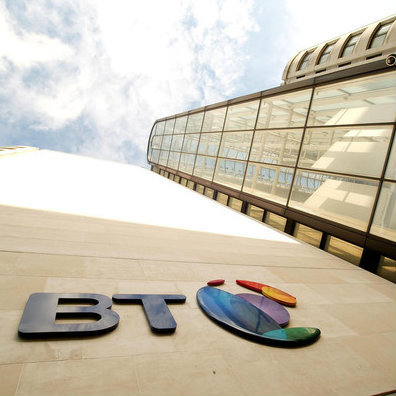The UK incumbent is now trading at its lowest level in more than a decade and its job is not about to get easier.

"Great for shareholders" was how BT boss Philip Jansen described his company's latest scheme to throw money at a full-fiber rollout covering 20 million UK homes by the mid-to-late 2020s. That's up from an ambition of 15 million previously and will come at the expense of dividends, jobs and with zero indication of the impact on earnings, after BT scrapped its usual guidance.
Investors, unsurprisingly, were not having it. BT's share price tumbled 8% during mid-morning trading in London and, at about 105 pence sterling, has not been this low since 2009. It has toppled from a high point in the last 15 years of 496.45, achieved in November 2015 before a spate of problems under previous management.
BT is guiding for a pre-tax nominal return on its full-fiber investment of between 10% and 12%, but that is down from 15% under its part-fiber plans and did not satisfy analysts during an earnings call this morning, upset that guidance was cut on COVID-19 uncertainty.
"You need to figure out for yourself how it will play out but I think the investment case is pretty compelling and there is a decent return to be had going forward," Jansen said after one disgruntled analyst complained that he would not be able to figure out BT's progression.
How much will it all cost? BT has already reached about 2.6 million homes, leaving it with another 17.4 million to cover. It continues to estimate rollout costs at £300 ($371) to £400 ($495) per property, for a total remaining bill of between £5.2 billion ($6.4 billion) and £7 billion ($8.7 billion). After BT last year spent £3.9 billion ($4.8 billion) on its mixture of network, IT and other projects, all the indications are that annual spending will rise.
Add 5G and IT investments into the capex budget, and it is no wonder BT has slashed the final dividend payment for the just-ended fiscal year and suspended all dividends for the one that has just started. When they eventually resume a year later, it will be at the rebased level of 7.7 pence per share, just half the previous level. Ouch.
So why up the full-fiber targets now? BT has clearly been under sustained pressure from government authorities worried the UK is lagging other parts of Europe on full-fiber rollout. Even if regulators are prepared to offer it more leeway, its concern will be that a lack of ambition could backfire and possibly result in the full separation of Openreach, the networks progeny that now operates at arm's length from the parent (but not far enough from it, say detractors).
Nor is government intrusion the only threat. Full-fiber competition is on the rise in the UK and a new competitive challenge surfaced this morning with news of a £31 billion ($38.4 billion) merger between O2, the UK's biggest mobile operator, and Virgin Media, a cable operator that is BT's main fixed-line rival. Both companies have been customers of BT, and both are likely to reduce their spending on BT services following a tie-up.
Jansen put on his bravest face when quizzed about the impact. "Will there be bits of the business they try to put into their own business? Of course, but I'm sure we can manage that and there will be opportunities from this for BT," he said.
Besides cutting dividends, BT is also taking an even bigger axe to internal costs even before the full completion of an even earlier "transformation" initiative that has so far culled about 9,000 jobs. That program, BT claims, has already delivered about £1.6 billion ($2 billion) in annual cost savings, but it's far from obvious. Under new accounting rules, BT's post-tax profit fell one fifth, to about £1.7 billion ($2.1 billion), as revenues dipped 2%, to roughly £22.9 billion ($28.3 billion).
Want to know more about 5G? Check out our dedicated 5G content channel here on Light Reading.
While BT still has another 4,000 roles to cut under that earlier scheme, Jansen has discovered there is still major room for improvement beyond this figure. "Extensive use of legacy networks is holding us back," he said. Processes are still too complex with high levels of "manual intervention." The only so-called "zero touch" service is BT Sport. His plan is to make the majority of "customer journeys" fully automated by the end of 2025.
If that makes observers ponder exactly what BT has been doing on digital transformation, Jansen today insisted the just-completed "phase" (which no one previously knew was a phase) was mainly about restructuring. Yet BT's overall headcount does not seem to have changed all that much from its level of around 105,000 employees. Other recruitment activity has, essentially, offset most of the BT layoffs.
That said, BT's annual operating costs in the last fiscal year were about £1.3 billion ($1.6 billion) less than it spent three years earlier. Now, without discussing the precise impact on jobs, it is targeting another £1 billion ($1.2 billion) in annual savings by March 2023 and £2 billion ($2.4 billion) by March 2025. Getting there, however, will cost another £2.2 billion ($2.7 billion).
This is clearly not the announcement BT shareholders wanted Jansen to make at the conclusion of his first full fiscal year in charge of the UK operator. If they wanted further turmoil and a continued ebbing of value, they could have stuck with predecessor Gavin Patterson. COVID-19 might conceal some of Jansen's blushes, providing a reasonable excuse for business pressure in areas including sport and near-term fiber installation. But any honeymoon period he enjoyed is firmly over.
Related posts:
— Iain Morris, International Editor, Light Reading
Read more about:
EuropeAbout the Author(s)
You May Also Like










